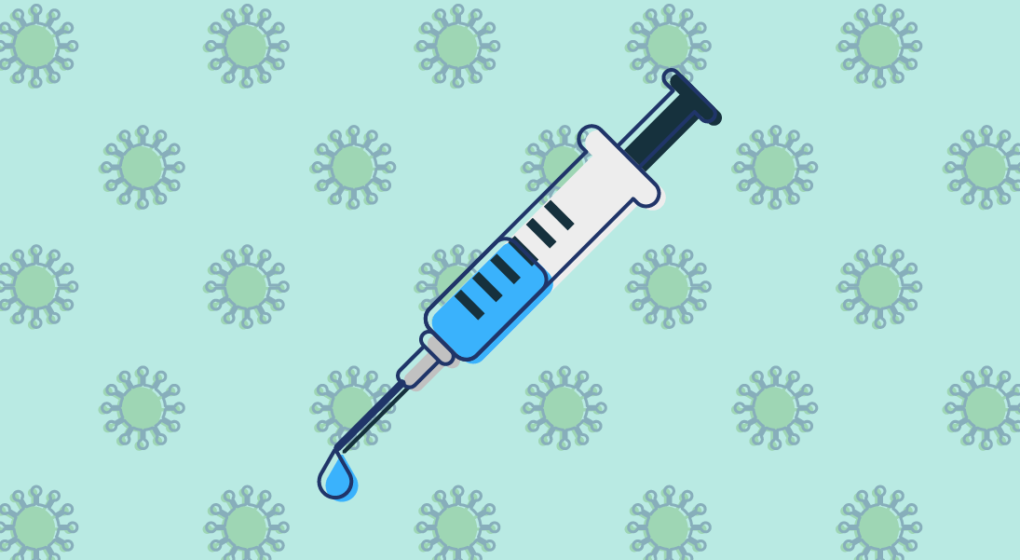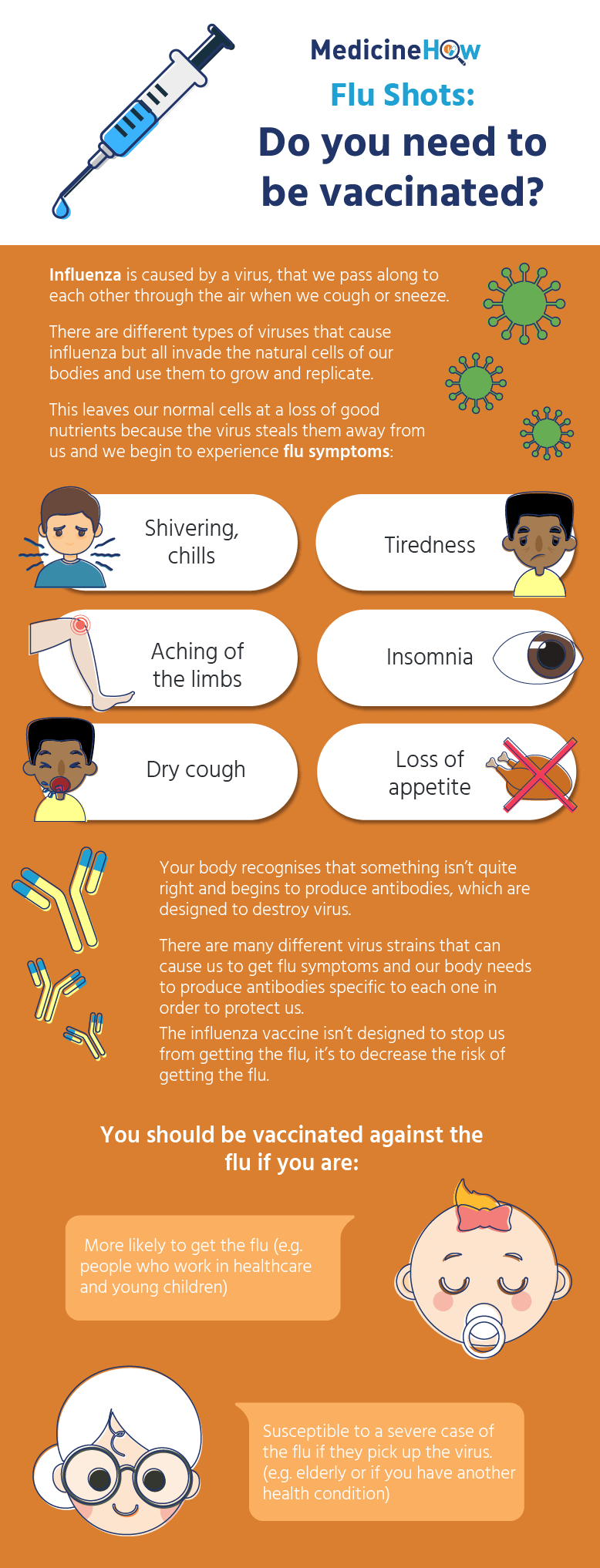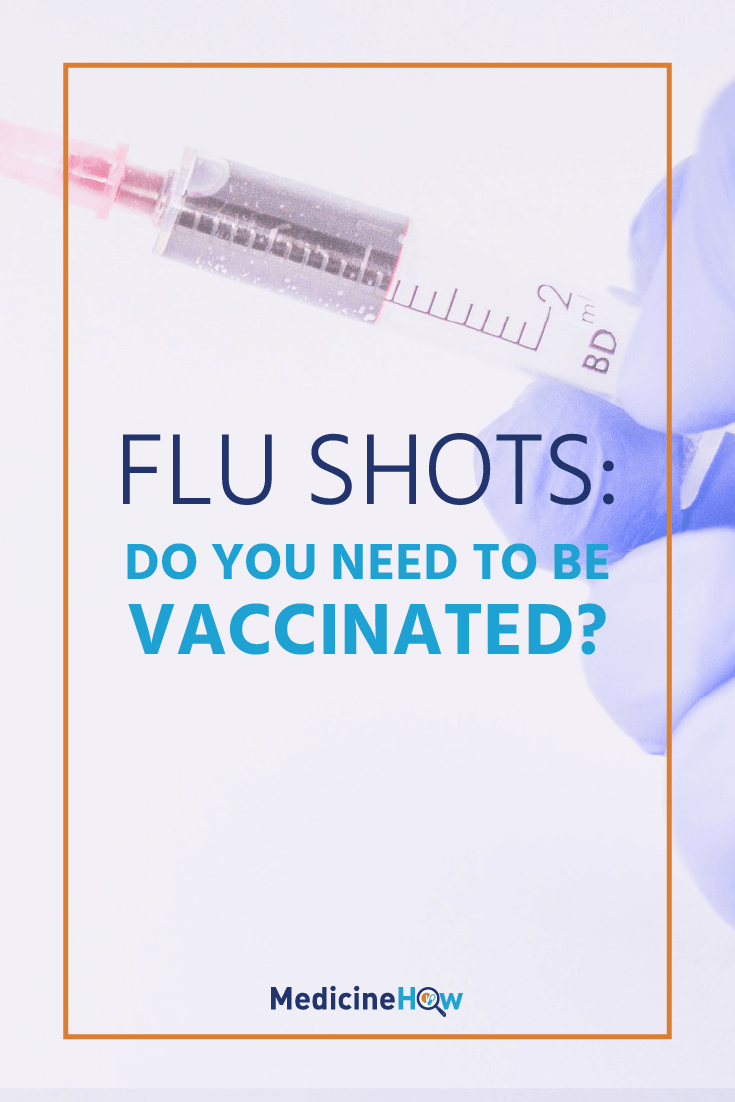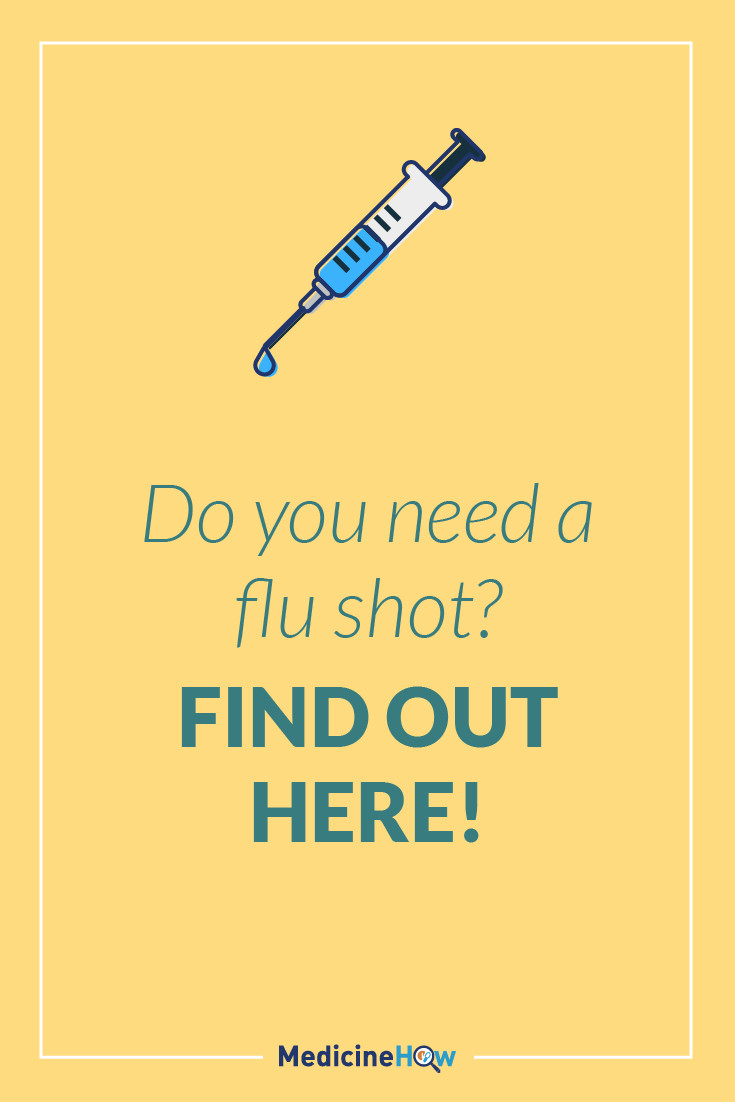
Okay, it’s time to lay down the facts about flu vaccinations. We’re going to have a look at the flu, how vaccinations can help and then get into the juicy stuff: do you need a flu shot?
What is the flu?
Let’s start with the culprit – after all, he’s the one who instigates the whole problem. The flu. That shady guy.
When he strikes, he really knocks you down and without a moments notice. While a common cold can take days to develop, the flu comes up more suddenly and makes you experience these sort of symptoms:
- Shivering, chills
- Tiredness
- Aching of the limbs
- Insomnia
- Dry cough
- Loss of appetite
Usually, you’re bound to bed unable to carry out the daily activities in your life as normal. Fortunately, in most cases our body is able to fight it off and we get better a without medical treatment in a few days or up to a week.
How does this happen?
Influenza is caused by a virus, that we pass along to each other through the air with coughs and sneezes. There are different strains (types) of viruses that cause influenza but all invade the natural cells of our bodies and use them to grow and replicate. This, of course, leaves our normal cells at a loss of good nutrients because the virus steals them away from us before we get a chance to use them and we begin to experience flu symptoms.
But all is not lost. Our body has an army that will fight valiantly against the influenza virus. We recognise that something isn’t quite right and begin to produce antibodies, substances that are designed to destroy the things that pose a threat within us. Each antibody is targeted against a particular virus – so if you get the flu, your body will produce a particular type of antibody, then if you get another strain of the flu virus, your body will need to produce a different type of antibody.
However, sometimes our body’s defence mechanism doesn’t quite go according to plan. In fact, one in every 60 deaths in Australia is due at least in part to influenza or pneumonia, although most of these are elderly with other conditions that also contribute to the death (read more). If this is the case, wouldn’t a vaccine that can prevent the flu be incredibly useful?
How does the flu vaccination work?
Okay, so we know that there are many different virus strains that can cause us to get flu symptoms and, unfortunately, our body needs to produce antibodies specific to each one in order to protect us. The question remains: how can a flu shot stop us from getting the flu when there are so many different types?
The truth of the matter is that it can’t. The influenza vaccine isn’t designed to stop us from getting the flu, it’s to decrease the risk of getting the flu.
The way we do this is by predicting which viruses will be most common in the each flu season. Specialists decide on three strains that they believe are going to be among the trouble makers of the year and it is these three strains that are put into the vaccine.
In 2014, for example, the three strains in the Australian vaccine are A/California/7/2009 (H1N1), A/Texas/50/2012 (H3N2) and B/Massachusetts/02/2012. The first was a component of the 2013 vaccination, but the second two are new additions.
What the vaccine actually does is send the message to your body to begin producing antibodies. This process can take a few weeks and, for this reason, you should get vaccinated well before the flu season starts in order for it to be effective.
Like all vaccinations, there are some things that you may experience as a result of getting a flu shot. It is common to get soreness, redness and swelling at the actual injection site, as well as aches and a light fever (read this). Babies less that six months old should not be vaccinated.
Want to take a look at the evidence? This review takes of thirty quality studies to draw the conclusion that flu shots do indeed provide moderate protection in healthy people, and another review of over ninety studies shows modest protection. In short, research says it works with the benefits outweighing the risks, although there doesn’t seem to be enough research for particular groups, such as the elderly (read here).
It is worth noting that the influenza vaccine will not prevent new strains of the flu. For example, in 2009 the H1N1 virus strain (the bird flu) appeared and panic was spread all around the world – this strain was not in the vaccine and it took them months (until it was too late) to produce a vaccine that would be effective in preventing it. As such, while flu shots can decrease the risk of you getting some strains, they will not stop you from getting the flu at all.
Who should get a flu shot?
Essentially, there are two groups of people who should be vaccinated against the flu. People that are:
- More likely to get the flu
- Susceptible to a severe case of the flu if they pick up the virus.
 The first group consists of people who work in healthcare and young children. People who work with sick people are constantly exposed to virus particles as they try to help infected people get better. Young children, on the other hand, touch everything as they explore the world and are much more likely to come into contact with virus particles and come down with the flu. Whereas 5-10% of adult get the flu each year, 20-30% of children do (read more). Usually these people have relatively strong immune systems and beat the virus within a week, however, so the vaccination is a matter of convenience to avoid getting sick when it is likely.
The first group consists of people who work in healthcare and young children. People who work with sick people are constantly exposed to virus particles as they try to help infected people get better. Young children, on the other hand, touch everything as they explore the world and are much more likely to come into contact with virus particles and come down with the flu. Whereas 5-10% of adult get the flu each year, 20-30% of children do (read more). Usually these people have relatively strong immune systems and beat the virus within a week, however, so the vaccination is a matter of convenience to avoid getting sick when it is likely.
The second group of people are those who are more likely to have bad consequences if the do get the flu. The people we are truly concerned about here are the ones whose lives end prematurely due (at least in part) to the flu. The elderly make up the vast majority of deaths due to influenza, which is linked to  their less active immune system. Nearly three quarters of people who die with the flu in Australia have other health conditions, such as heart and kidney disease, that likely contribute to their decreased ability to fight the virus (read more).
their less active immune system. Nearly three quarters of people who die with the flu in Australia have other health conditions, such as heart and kidney disease, that likely contribute to their decreased ability to fight the virus (read more).
Finally, if you simply want to get a flu shot, do so. Avoiding getting the flu, or shortening of the symptoms is certainly a bright point that many don’t want to lose. Additionally, the more people who get vaccinated, the less the influenza virus will be passed around as less people are susceptible to become infected – so getting a flu shot can help to reduce the flu in the entire community.
On the other hand, please do not feel obligated to get a flu shot. For healthy adults, if you don’t mind taking your chances to fall ill for a few days with a bad case of the flu, there isn’t any real reason for you to get a flu shot.
Do you need to get vaccinated every year?

The answer to this is a resounding yes, for two simple reasons.
Firstly, the vaccine changes every year because the virus strains are continually changing. What was most common last year may not be the strain that invades your community this year, so your body has to develop the protection it needs each year.
Secondly, the antibody protection provided after vaccination fades with time. Even though the H1N1 strain was included in the vaccine last year, it has been included again this year, which will boost the antibody levels of the people who get the flu shot every year. Whilst a previous flu shot may provide you with some protection, it is certainly best to be vaccinated every year.
A note for any Australians:
If you live in Australia, you are entitled to free influenza vaccine if you are determined to be at high risk of getting a bad case of the flu. This includes many of the groups I mentioned above plus a few more, so have a read here and talk to your doctor or pharmacist today (many pharmacies have flu clinics this year, so you may not even need to visit your GP). There are likely similar programs in other countries, so ask some questions to find out.
For those of you not eligible, the flu shot is your call. It is relatively inexpensive anyway, and could save you a few sick days.
Pin it!




